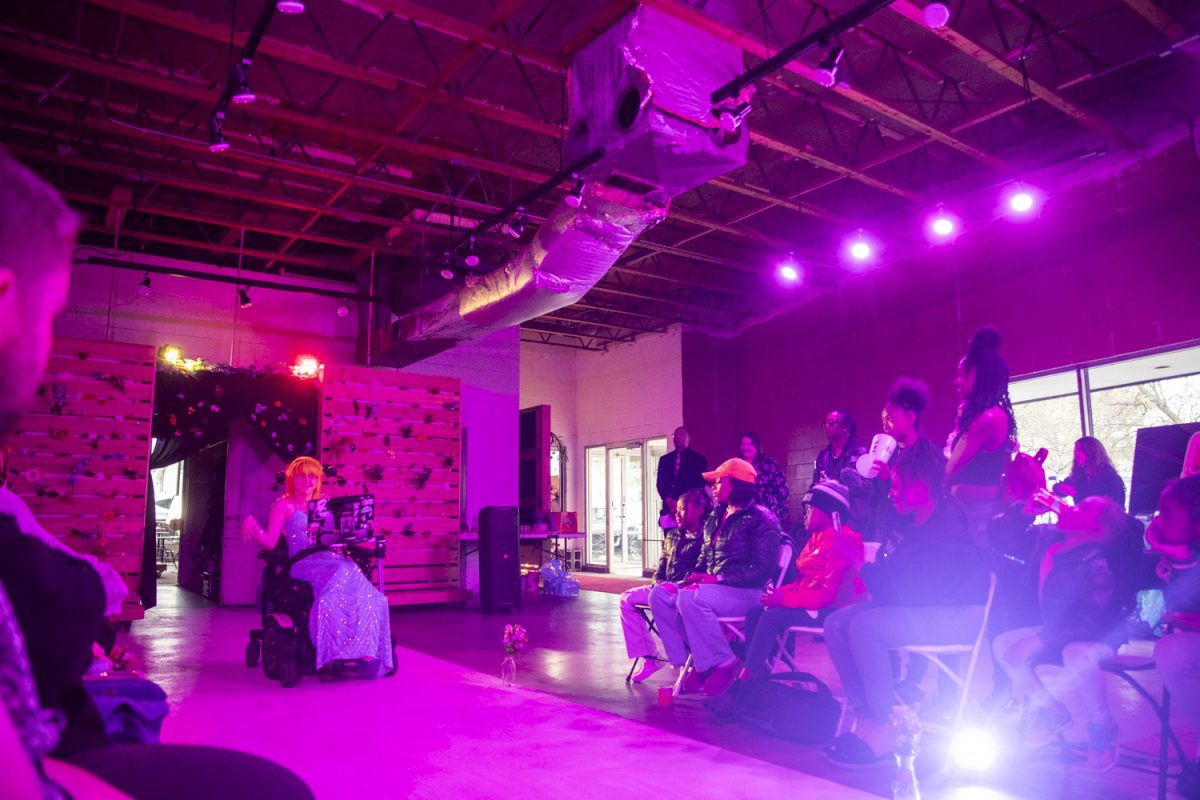"OK, let’s get started," said Nilo Couret, a graduate fellow in the University of Iowa’s cinema/comparative literature department. It was a Thursday night in November, and he began hosting a film session in 101 Becker Communication Studies Building by explaining the context and cultural nuances that define certain films from Latin America.
Couret hosted a weekly film screening for a seminar on Latin American comedy throughout the semester. The screenings were open to the public, but the discussion afterwards was geared toward students. Couret often fostered discussion by talking about subtitles and the audiences for which the films were made.
He sees his role as an instructor as a "tricky" one because of his status as a representative of Latin America.
"I’m responsible for the narrative to the cinema and the history of that region," he said later in his office.
Couret is an American-born citizen of the United States who speaks English with the same accent and speech patterns of a network news anchor. However, he also considers himself a Latino, because he was raised in Venezuela by Cuban parents. Although he has strong roots in different cultures, he initially tried to avoid filling the role of "Latino representative" when he began teaching at the UI.
"When I came to Iowa, I didn’t plan to teach anything Latin American," he said. "I kind of wanted to avoid being typed as the person who does Latin America."
The ‘National Geographic way of teaching’
Couret graduated from Columbia University. When he came to the UI, he quickly discovered that Latin American culture was poorly represented at the university. In instruction and dialogue, he was concerned people who didn’t necessarily understand the context were the ones leading discussions on Latin America.
As a result, he chose to give his audiences the context behind Latin American films. He showed work from different time periods in Argentina, Bolivia, and a variety of other Latin American countries in an characteristically "National Geographic way of teaching," he said. He decided to focus this seminar on comedies in particular because he believed they were cultural lenses largely unknown to the rest of the world.
Couret is uniquely qualified to give the context behind these comedies. Corey Creekmur, a UI English and cinema/comparative literature associate professor who has worked with Couret, described him as a "cosmopolitan film scholar" who has a "keen awareness of the crucial distinctions between different Latin American national cinemas and their comic traditions."
Couret emphasized that many Latin American comedies are still unexplored representations of culture in film study.
"[The films] don’t travel, they’re not necessarily accessible to us in the same ways, and therefore, we don’t know about them," he said. "They don’t get written about, and then, they don’t get taught."
But Couret stressed that comedy was hardly a medium with which to accurately present Latin American culture to UI students. Instead, he saw the course as more of a backstage pass into renderings of what Latin America may or may not be.
"It’s more about understanding what it means for you to have access to this place at all," he said. "And making that question of access something worth studying."
Audience effect
In the theater, Couret explained the context and dimmed the lights. He began the film session by showing an episode of "Las Aventuras de Hijitus" ("The Adventures of Hijitus"), the tale of a small boy named Hijitus who transforms into a super version of himself to defeat villains. A few people in the 30-person audience laughed aloud at the clumsiness of the comic’s oafish antagonists.
Couret noted that half the audience members are typically students. His belief is that the size of his audience affects the quality of the film screening and emphasized that a curious communal aspect to watching films amplified the overall comedic experience.
At times, he faced the challenge of explaining to students how authentically Latin American the comedies are to their specific cultures. Many films incorporate foreign influences and references, and some, such as ÁVampiros en la Habana! (Vampires in Havana!), prominently portray American villains who speak poor Spanish with exaggerated American accents.
But instead of trying to typify a comedy as representative or not of such a diverse Latin American culture, he noted that more could be gleaned from a comedy’s original, intended audience than from the actual comedy.
"Somehow, the audience in mind is still a local audience," he said. "The language, the humor, the spaces, the kinds of references at times are foreign to you. It doesn’t easily allow us to kind of just take a side in that debate."
Cultural discretion through subtitles
By the time Couret began playing the feature film, it was clear that many in the audience relied on the English subtitles at the bottom of the screen to understand what was being said. Most laughed after reading them, whether before or after characters had said their lines in Spanish.
For the seminar, Couret translated and subtitled approximately a quarter of the films, a process he described as painstaking and laborious. He estimated it took around an hour or more to subtitle five minutes of film.
But he has the disposition to subtitle films that were once available only to Spanish-speaking audiences. Steve Choe, a cinema assistant professor who has advised Couret in his doctoral work, described him as someone who is constantly thinking and has a lot of energy.
Couret has learned firsthand the importance of subtitles in preserving comedic effect across cultures and has encountered scenarios that call for a great amount of cultural discretion. It has also indirectly helped him make the students "aware of subtitling in a way they hadn’t thought about it before."
"It has made me gain new appreciation for subtitling as labor that we never notice when we watch a film," he said wryly. "It’s a lot of work."
He presented this scenario: If certain words used for comedic effect rhyme in Spanish but not English, how should they be translated? At what moment during a narration should the translation be inserted into subtitles to retain the timing of the joke? Will an American audience laugh at the joke or at the inaccuracy of the subtitle?
"It’s been tedious," he said. "But at the same time, it’s actually proven to be like a very creative way of trying to think about and work through the film."
Fin
Two hours after it started, Thursday night’s film screening was over. Some people filed out of the room, students remained in their seats, and Couret moved center stage to begin facilitating the discussion.
At this moment, he once again began grappling with the question of his background. Should he have revealed that his parents were Cuban before discussing the Cuban animation director Juan Padrón and his film about vampires?
"Teaching the class as somebody who’s from somewhere else has been interesting," he remarked. "One of the things that I struggle with is how much to foreground my personal experience."
He acknowledged that his experience as an instructor showed him that personal "markers of race, gender, sexuality, and class tend to change the way the conversation happens." Consequently, he has instead focused on discussing how comedy presents a "built-in difference" between cultures and carefully exploring his identity through the prism of his teaching.
Furthermore, because he aspires to teach and research after receiving his doctorate in film studies, he sees the seminar as a way to personally analyze the way his cultural experiences frame the way his students perceive him.
"Being marked in a very particular way, as a professor, I always wonder now if that is determining," Couret said before pausing. "I don’t know if it is. That’s one of the questions I have."






